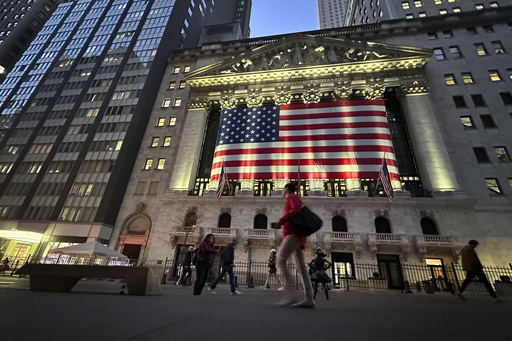
Asian stock markets experienced an uptick on Tuesday, contrasting with the dip seen in China, following a partial recovery in U.S. equities from last week’s declines.
Oil prices and futures for U.S. markets also saw slight increases during this trading session.
In Tokyo, the Nikkei 225 index recorded a gain of 0.4%, reaching 38,471.58, while South Korea’s Kospi increased by 0.2% to 2,474.26.
Meanwhile, Chinese markets showed some volatility amid apprehensions regarding potential tariff increases from the upcoming administration headed by President-elect Donald Trump, alongside doubts about the effectiveness of newly announced stimulus measures in revitalizing the economy.
The Shanghai Composite index fell by 0.9%, closing at 3,305.09, while Hong Kong’s Hang Seng index rebounded slightly after a dip, eking out a gain of less than 0.1% to settle at 19,588.10.
Investor sentiment appears to be cautious overall, with analysts noting resilience in market futures despite the reasonable concerns about an impending global trade conflict that may hinder bolder investment strategies.
Countries like India saw notable gains, with the Sensex climbing by 1.2%. Taiwan’s Taiex surged by 1.3%, and the SET index in Bangkok rose by 1.1%.
On the previous trading day, the S&P 500 index increased by 0.4%, marking its first rise in three days, and closed at 5,893.62. The Dow Jones Industrial Average experienced a minor slip, falling by 0.1% to 43,389, while the Nasdaq Composite rose by 0.6% to 18,791.81.
These market movements signify a recovery of sorts, as investors previously saw a sell-off that wiped out more than half of the market gains realized after the U.S. presidential election.
Following Trump’s electoral victory, the S&P 500 had gained nearly 4%, particularly benefiting bank stocks and smaller companies that were anticipated to thrive under policies favoring lower tax rates and reduced regulation.
Notably, CVS Health saw an increase of 5.4% as it announced the addition of four new members to its board of directors. Additionally, Liberty Energy shares surged by 4.9% after Trump appointed its CEO, Chris Wright, as his nominee for Secretary of Energy.
In contrast, Spirit Airlines experienced a trading halt after announcing a deal with its creditors as part of a Chapter 11 bankruptcy protection plan. The airline intends to continue its operations during the restructuring process, but this could potentially erase the value of current shareholders’ holdings.
With the upcoming changes under the Trump administration, investors are on alert for potential economic challenges. Moderna, which rose by 7.2% on Monday, remains below previous levels following concerns about Trump planning to appoint prominent anti-vaccine figure Robert F. Kennedy Jr. to lead the Department of Health and Human Services.
Additionally, rising fears of inflation under Trump have led to increased Treasury yields in the bond market, raising concerns that the Federal Reserve might struggle to lower interest rates amidst an effort to stimulate the economy and sustain job market growth.
This week, several major corporations will announce their quarterly earnings, with Nvidia, a major player valued at nearly $3.5 trillion, set to disclose results on Wednesday. The company will need to meet high expectations for growth to maintain its impressive stock price, which has skyrocketed by 183% this year.
Also reporting this week are Lowe’s and Walmart on Tuesday, Target on Wednesday, and Deere on Thursday. These retail giants are expected to give insights after a recent report indicated that spending at U.S. retailers outperformed expectations last month.
In further market activity on early Tuesday, benchmark U.S. crude oil traded higher by 1 cent at $69.18 per barrel on the New York Mercantile Exchange, while Brent crude rose by 4 cents to $73.34 per barrel.
The U.S. dollar weakened against the Japanese yen, falling to 154.50 yen from 154.67, and the euro dipped to $1.0587 from $1.0599.
